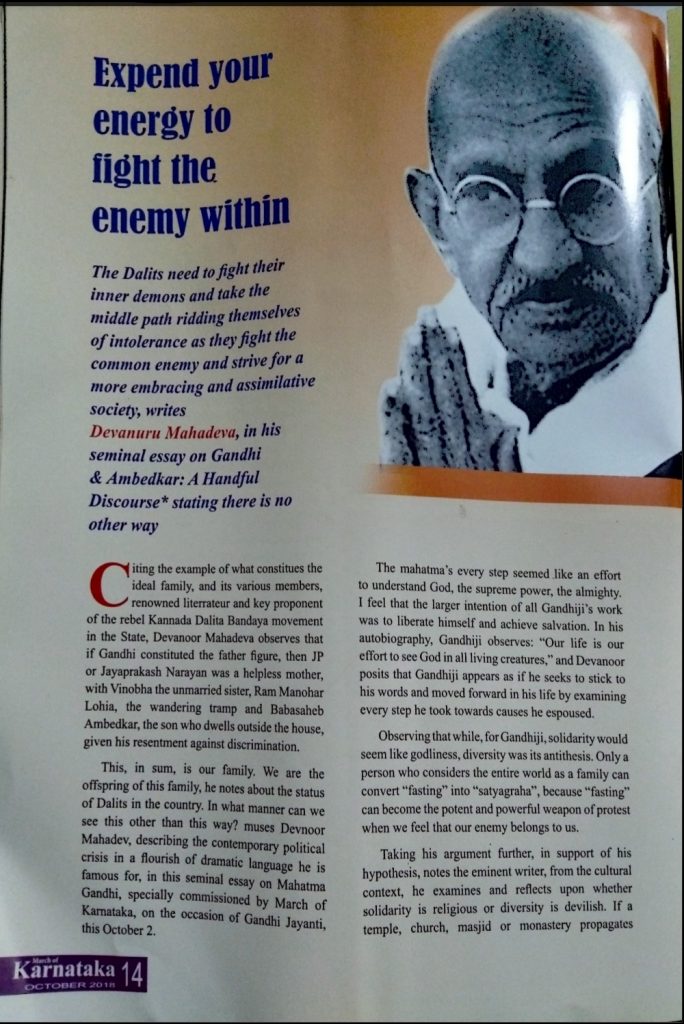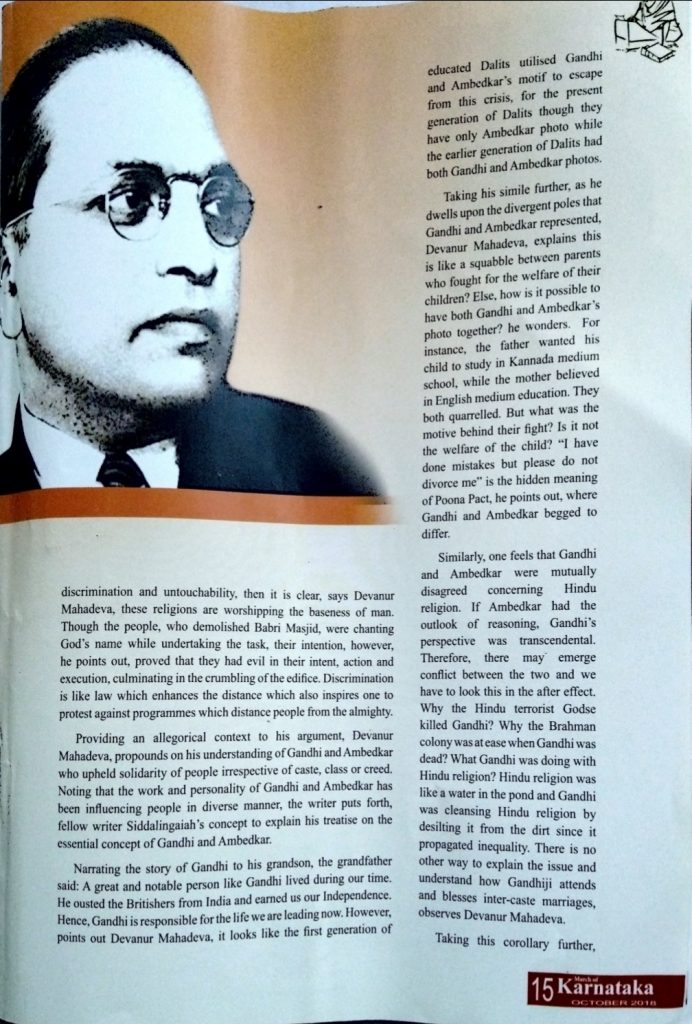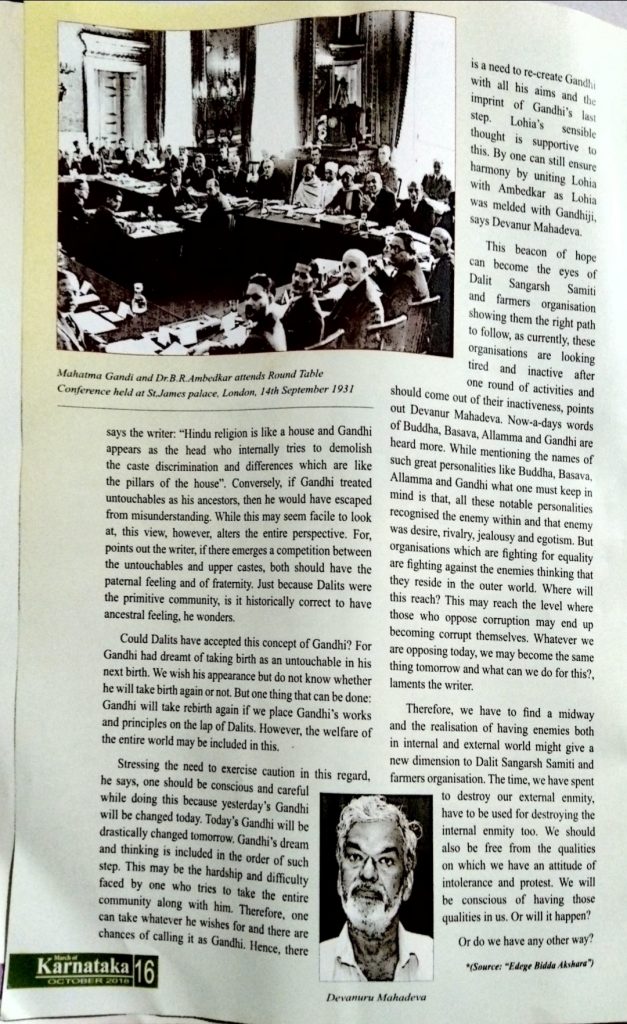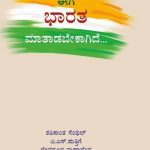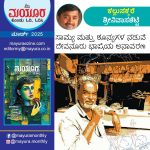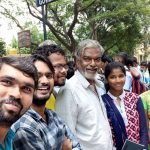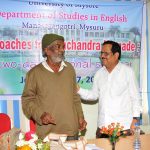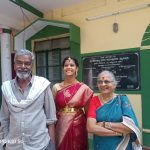Expend your energy to fight the enemy within….
[The article “Gandhi-Ambedkar Ondishta Matu” from Devanur Mahadeva’s collection “Edege Pidda Akshara” has been re-narrated in English by journalist D.K.Vishwanath in the “March of Karnataka-October 2018” issue of the English monthly, published by the Karnataka News and Public Relations Department. .“Namma Banavasi”‘s heartfelt thanks to VL Narasimhamurthy, a young thinker and English teacher, who has given the information to us. And also special thanx to N.R Vishukumar, retired Director, News and Public Relations Department, who gave full details about the publication of the article. ದೇವನೂರ ಮಹಾದೇವ ಅವರ ‘ಎದೆಗೆ ಬಿದ್ದ ಅಕ್ಷರ’ ಸಂಕಲದ “ಗಾಂಧಿ-ಅಂಬೇಡ್ಕರ್ ಒಂದಿಷ್ಟು ಮಾತು” ಲೇಖನವನ್ನು ಪತ್ರಕರ್ತರಾದ ಡಿ.ಕೆ.ವಿಶ್ವನಾಥ್ ಅವರು ಇಂಗ್ಲಿಷ್ನಲ್ಲಿ ಮರು ನಿರೂಪಿಸಿದ್ದು, ಅದು ಕರ್ನಾಟಕ ವಾರ್ತಾ ಮತ್ತು ಸಾರ್ವಜನಿಕ ಸಂಪರ್ಕ ಇಲಾಖೆಯಿಂದ ಪ್ರಕಟವಾಗುತ್ತಿದ್ದ ಇಂಗ್ಲಿಷ್ ಮಾಸಿಕ “March of Karnataka-October 2018” ರ ಸಂಚಿಕೆಯಲ್ಲಿ ಪ್ರಕಟವಾಗಿದೆ. ಇದನ್ನು ಹುಡುಕಿ ನೀಡಿದ ಯುವ ಚಿಂತಕರೂ, ಇಂಗ್ಲಿಷ್ ಅಧ್ಯಾಪಕರೂ ಆದ ವಿ.ಎಲ್.ನರಸಿಂಹಮೂರ್ತಿ ಅವರಿಗೂ ಹಾಗೂ ಲೇಖನ ಪ್ರಕಟಣೆಯ ಕುರಿತ ಸಂಪೂರ್ಣ ವಿವರವನ್ನು ನೀಡಿದ ವಾರ್ತಾ ಮತ್ತು ಸಾರ್ವಜನಿಕ ಸಂಪರ್ಕ ಇಲಾಖೆಯ ನಿವೃತ್ತ ನಿರ್ದೇಶಕರಾದ ಎನ್.ಆರ್.ವಿಶುಕುಮಾರ್ ಅವರಿಗೂ “ನಮ್ಮ ಬನವಾಸಿ”ಯ ಹೃದಯಪೂರ್ವಕ ಧನ್ಯವಾದಗಳು.]
[The Dalits need to fight their inner demons and take the middle path ridding themselves of intolerance as they fight the common enemy and strive for a more embracing and assimilative society, writes Devanuru Mahadeva, in his seminal essay on Gandhi & Ambedkar: A Handful Discourse* stating there is no other way]
Citing the example of what constitues the ideal family, and its various members, renowned literrateur and key proponent of the rebel Kannada Dalita Bandaya movement in the State, Devanoor Mahadeva observes that if Gandhi constituted the father figure, then JP or Jayaprakash Narayan was a helpless mother, with Vinobha the unmarried sister, Ram Manohar Lohia, the wandering tramp and Babasaheb Ambedkar, the son who dwells outside the house, given his resentment against discrimination.
This, in sum, is our family. We are the offspring of this family, he notes about the status of Dalits in the country. In what manner can we see this other than this way? muses Devnoor Mahadev, describing the contemporary political crisis in a flourish of dramatic language he is famous for, in this seminal essay on Mahatma Gandhi, specially commissioned by March of Karnataka, on the occasion of Gandhi Jayanti, this October 2.
The mahatma’s every step seemed like an effort to understand God, the supreme power, the almighty. I feel that the larger intention of all Gandhiji’s work was to liberate himself and achieve salvation. In his autobiography, Gandhiji observes: “Our life is our effort to see God in all living creatures,” and Devanoor posits that Gandhiji appears as if he seeks to stick to his words and moved forward in his life by examining every step he took towards causes he espoused.
Observing that while, for Gandhiji, solidarity would seem like godliness, diversity was its antithesis. Only a person who considers the entire world as a family can convert “fasting” into “satyagraha”, because “fasting” can become the potent and powerful weapon of protest when we feel that our enemy belongs to us.
Taking his argument further, in support of his hypothesis, notes the eminent writer, from the cultural context, he examines and reflects upon whether solidarity is religious or diversity is devilish. If a temple, church, masjid or monastery propagates discrimination and untouchability, then it is clear, says Devanur Mahadeva, these religions are worshipping the baseness of man. Though the people, who demolished Babri Masjid, were chanting God’s name while undertaking the task, their intention, however, he points out, proved that they had evil in their intent, action and execution, culminating in the crumbling of the edifice. Discrimination is like law which enhances the distance which also inspires one to protest against programmes which distance people from the almighty.
Narrating the story of Gandhi to his grandson, the grandfather said: A great and notable person like Gandhi lived during our time. He ousted the Britishers from India and earned us our Independence. Hence, Gandhi is responsible for the life we are leading now. However, points out Devanur Mahadeva, it looks like the first generation of educated Dalits utilised Gandhi and Ambedkar’s motif to escape from this crisis, for the present generation of Dalits though they have only Ambedkar photo while the earlier generation of Dalits had both Gandhi and Ambedkar photos.
Taking his simile further, as he dwells upon the divergent poles that Gandhi and Ambedkar represented, Devanur Mahadeva, explains this is like a squabble between parents who fought for the welfare of their children? Else, how is it possible to have both Gandhi and Ambedkar’s photo together? he wonders. For instance, the father wanted his child to study in Kannada medium school, while the mother believed in English medium education. They both quarrelled. But what was the motive behind their fight? Is it not the welfare of the child? “I have done mistakes but please do not divorce me” is the hidden meaning of Poona Pact, he points out, where Gandhi and Ambedkar begged to differ.
Could Dalits have accepted this concept of Gandhi? For Gandhi had dreamt of taking birth as an untouchable in his next birth. We wish his appearance but do not know whether he will take birth again or not. But one thing that can be done: Gandhi will take rebirth again if we place Gandhi’s works and principles on the lap of Dalits. However, the welfare of the entire world may be included in this.
Stressing the need to exercise caution in this regard, he says, one should be conscious and careful while doing this because yesterday’s Gandhi will be changed today. Today’s Gandhi will be drastically changed tomorrow. Gandhi’s dream and thinking is included in the order of such step. This may be the hardship and difficulty faced by one who tries to take the entire community along with him. Therefore, one can take whatever he wishes for and there are chances of calling it as Gandhi. Hence, there is a need to re-create Gandhi with all his aims and the imprint of Gandhi’s last step. Lohia’s sensible thought is supportive to this. By one can still ensure harmony by uniting Lohia with Ambedkar as Lohia was melded with Gandhiji, says Devanur Mahadeva.
This beacon of hope can become the eyes of Dalit Sangarsh Samiti and farmers organisation showing them the right path to follow, as currently, these organisations are looking tired and inactive after one round of activities and should come out of their inactiveness, points out Devanur Mahadeva. Now-a-days words of Buddha, Basava, Allamma and Gandhi are heard more. While mentioning the names of such great personalities like Buddha, Basava, Allamma and Gandhi what one must keep in mind is that, all these notable personalities recognised the enemy within and that enemy was desire, rivalry, jealousy and egotism. But organisations which are fighting for equality are fighting against the enemies thinking that they reside in the outer world. Where will this reach? This may reach the level where those who oppose corruption may end up becoming corrupt themselves. Whatever we are opposing today, we may become the same thing tomorrow and what can we do for this?, laments the writer.
Therefore, we have to find a midway and the realisation of having enemies both in internal and external world might give a new dimension to Dalit Sangarsh Samiti and farmers organisation. The time, we have spent to destroy our external enmity. have to be used for destroying the internal enmity too. We should also be free from the qualities on which we have an attitude of intolerance and protest. We will be conscious of having those qualities in us. Or will it happen?
Or do we have any other way?
(Source: “Edege Bidda Akshara”)
